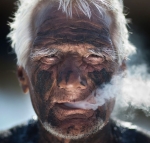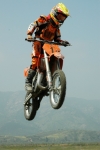Idea for a monitoring device (does this exist?)
-
GM
Idea for a monitoring device (does this exist?)
From the Googling/cpaptalk reading I've done and also from what my physician tells me, the kinds of devices to fight different types of sleep apnea are limited to roughly:
1. "Breathing assistants" CPAP, BiPAP, EPAP, etc. With or without mask.
2. Oral appliances you put in your mouth to physically keep airway unobstructed.
3. others I don't know of?
These devices mostly make it easier for you to live with the symptoms of apnea, but they don't actually treat it. And to be honest, they're pretty horrible to use in my opinion.
That got me thinking... Since sleep apnea is basically a malfunction of the brain's respiratory control system during sleep (AKA you "forget" to breathe), wouldn't it be more logical to try to train/condition your brain to sleep?
I'm an electronics engineer by trade and I was imagining a tiny device, which detects when you stop breathing. Think of something along the lines of a baby sleep monitor sensor pad for adults. What if such a device could "poke" you/vibrate or somehow alert you of a long breathing pause? Not by physically helping you breathe like xPAP devices do, but just by alerting you? The first nights would probably be horrible, since the device keeps waking you up all the time. But what if it would train/condition your brain in the long run to keep breathing while asleep?
Has this ever been researched or tried?
1. "Breathing assistants" CPAP, BiPAP, EPAP, etc. With or without mask.
2. Oral appliances you put in your mouth to physically keep airway unobstructed.
3. others I don't know of?
These devices mostly make it easier for you to live with the symptoms of apnea, but they don't actually treat it. And to be honest, they're pretty horrible to use in my opinion.
That got me thinking... Since sleep apnea is basically a malfunction of the brain's respiratory control system during sleep (AKA you "forget" to breathe), wouldn't it be more logical to try to train/condition your brain to sleep?
I'm an electronics engineer by trade and I was imagining a tiny device, which detects when you stop breathing. Think of something along the lines of a baby sleep monitor sensor pad for adults. What if such a device could "poke" you/vibrate or somehow alert you of a long breathing pause? Not by physically helping you breathe like xPAP devices do, but just by alerting you? The first nights would probably be horrible, since the device keeps waking you up all the time. But what if it would train/condition your brain in the long run to keep breathing while asleep?
Has this ever been researched or tried?
- zoocrewphoto
- Posts: 3732
- Joined: Mon Apr 30, 2012 10:34 pm
- Location: Seatac, WA
Re: Idea for a monitoring device (does this exist?)
Actually, your idea is what most of us already have within our brains. You see, most people have obstructive apnea. This is when the airway closes, and our brain panics, wakes us up, and disturbs our sleep in an effort to clear the airway. How long our events last depend on how quickly our brain wakes us up.GM wrote:From the Googling/cpaptalk reading I've done and also from what my physician tells me, the kinds of devices to fight different types of sleep apnea are limited to roughly:
1. "Breathing assistants" CPAP, BiPAP, EPAP, etc. With or without mask.
2. Oral appliances you put in your mouth to physically keep airway unobstructed.
3. others I don't know of?
These devices mostly make it easier for you to live with the symptoms of apnea, but they don't actually treat it. And to be honest, they're pretty horrible to use in my opinion.
That got me thinking... Since sleep apnea is basically a malfunction of the brain's respiratory control system during sleep (AKA you "forget" to breathe), wouldn't it be more logical to try to train/condition your brain to sleep?
I'm an electronics engineer by trade and I was imagining a tiny device, which detects when you stop breathing. Think of something along the lines of a baby sleep monitor sensor pad for adults. What if such a device could "poke" you/vibrate or somehow alert you of a long breathing pause? Not by physically helping you breathe like xPAP devices do, but just by alerting you? The first nights would probably be horrible, since the device keeps waking you up all the time. But what if it would train/condition your brain in the long run to keep breathing while asleep?
Has this ever been researched or tried?
The whole point of cpap is to keep the airway open so that we don't need to be disturbed all night long. For example, I stop breathing 79 times an hour. According to my sleep study, I had ZERO central apneas. What YOU are thinking of is central apnea events where the brain stops breathing without an obstruction. I don't have those. My brain never stops trying to breathe. It doesn't need to be reminded. I just need my airway to stay clear. It is already narrow, so it doesn't take much to cause a blockage. Now that a cpap machine keeps my airway open, I can sleep without 79 disturbances an hour. I can get through my sleep stages instead of being interrupted all night.
There is a device for sale online that is supposed to wake people up when they snore, but all it does is disturb sleep. There is no way to train your throat to stay open while asleep. We cannot intentionally close our throat, so how would we learn to un-close it? We can't even do this awake, let alone asleep.
Perhaps someday there will be a cure for sleep apnea (all versions). Right now, the different types of cpap machines are very successive at keeping people breathing without disturbing their sleep. For example, somebody like me with obstructive apnea just needs enough airflow to keep my throat from collapsing. No collapses - no sleep disturbances - no oxygen desaturations - great sleep. People with central apnea need something to keep them breathing when their brain doesn't send the signals correctly. The machine
can sense that and restart their breathing without disturbing them. Again - no sleep disturbances - no oxygen desaturations - great sleep. Most people with sleep apnea have obstructive sleep apnea, or complex sleep apnea (both central and obstructive). The machines do take some calibrations to get the right machine and the right settings for the individual person. But once set correctly, they work very well.
If you are really hoping to create something that will cure sleep apnea, you will need to learn more about the different types, and what causes them. For example, people are learning that physiology plays a big part in obstructive apnea. Small mouth, small chin, small airway. Many of us had teeth removed because of having a small mouth. If we had received treatment to enlarge the jaw instead, we might not have sleep apnea. That's not a sure thing since we don't really have good studies on that yet. But there are patterns that are emerging, and there may be ways to prevent sleep apnea in future generations.
_________________
| Mask: Quattro™ FX Full Face CPAP Mask with Headgear |
| Humidifier: S9™ Series H5i™ Heated Humidifier with Climate Control |
| Additional Comments: Resmed S9 autoset pressure range 11-17 |
Who would have thought it would be this challenging to sleep and breathe at the same time?
Re: Idea for a monitoring device (does this exist?)
What you are referring to here is Central Sleep Apnea...not...Obstructive Sleep Apnea (Which most people on this board are suffering with). Also...the machines you mentioned are not "breathing assistants". They open the airway which allows you to breathe.GM wrote:From the Googling/cpaptalk reading I've done and also from what my physician tells me, the kinds of devices to fight different types of sleep apnea are limited to roughly:
1. "Breathing assistants" CPAP, BiPAP, EPAP, etc. With or without mask.
2. Oral appliances you put in your mouth to physically keep airway unobstructed.
3. others I don't know of?
These devices mostly make it easier for you to live with the symptoms of apnea, but they don't actually treat it. And to be honest, they're pretty horrible to use in my opinion.
That got me thinking... Since sleep apnea is basically a malfunction of the brain's respiratory control system during sleep (AKA you "forget" to breathe), wouldn't it be more logical to try to train/condition your brain to sleep?
I'm an electronics engineer by trade and I was imagining a tiny device, which detects when you stop breathing. Think of something along the lines of a baby sleep monitor sensor pad for adults. What if such a device could "poke" you/vibrate or somehow alert you of a long breathing pause? Not by physically helping you breathe like xPAP devices do, but just by alerting you? The first nights would probably be horrible, since the device keeps waking you up all the time. But what if it would train/condition your brain in the long run to keep breathing while asleep?
Has this ever been researched or tried?
_________________
| Machine: ResMed AirSense™ 10 AutoSet™ CPAP Machine with HumidAir™ Heated Humidifier |
| Mask: Fisher & Paykel Vitera Full Face Mask with Headgear (S, M, or L Cushion) |
| Additional Comments: Back up is S9 Autoset...... |
Re: Idea for a monitoring device (does this exist?)
And there is a very new (semi-experimental?) device out now, an implant that stimulates your (vagus?) nerves to breathe, but again that would be for central (or clear airway) apnea, not the run of the mill obstructive kind that Cpap works on.
_________________
| Mask: Ultra Mirage™ Full Face CPAP Mask with Headgear |
| Humidifier: IntelliPAP Integrated Heated Humidifier |
-
GM
Re: Idea for a monitoring device (does this exist?)
Ah, I'm sorry. I didn't realize this board is mainly for people suffering with obstructive sleep apnea. The idea I talked about is indeed assuming central sleep apnea (which I have) and not obstructive or complex apnea.LSAT wrote:What you are referring to here is Central Sleep Apnea...not...Obstructive Sleep Apnea (Which most people on this board are suffering with). Also...the machines you mentioned are not "breathing assistants". They open the airway which allows you to breathe.GM wrote:From the Googling/cpaptalk reading I've done and also from what my physician tells me, the kinds of devices to fight different types of sleep apnea are limited to roughly:
1. "Breathing assistants" CPAP, BiPAP, EPAP, etc. With or without mask.
2. Oral appliances you put in your mouth to physically keep airway unobstructed.
3. others I don't know of?
These devices mostly make it easier for you to live with the symptoms of apnea, but they don't actually treat it. And to be honest, they're pretty horrible to use in my opinion.
That got me thinking... Since sleep apnea is basically a malfunction of the brain's respiratory control system during sleep (AKA you "forget" to breathe), wouldn't it be more logical to try to train/condition your brain to sleep?
I'm an electronics engineer by trade and I was imagining a tiny device, which detects when you stop breathing. Think of something along the lines of a baby sleep monitor sensor pad for adults. What if such a device could "poke" you/vibrate or somehow alert you of a long breathing pause? Not by physically helping you breathe like xPAP devices do, but just by alerting you? The first nights would probably be horrible, since the device keeps waking you up all the time. But what if it would train/condition your brain in the long run to keep breathing while asleep?
Has this ever been researched or tried?
Re: Idea for a monitoring device (does this exist?)
This board is for all folks suffering from any type of sleep apnea.GM wrote:Ah, I'm sorry. I didn't realize this board is mainly for people suffering with obstructive sleep apnea. The idea I talked about is indeed assuming central sleep apnea (which I have) and not obstructive or complex apnea.
It just turns out that over 90% of folks with sleep apnea, suffer from obstructive sleep apnea so most of the conversations relate to that.
Some, like me, have complex sleep apnea and require a special machine to cope with it.
Back to your original post, there is an experimental device that attempts to keep the airway open like a pacemaker. I believe it is a stimulator that stimulates the airway muscles to keep the airway from collapsing. As I recall, it does sense the collapse of airway in some manner. I'm pretty sure it does not do anything for central apneas. I can't recall where it is described but will search if anyone expresses interest.
We'd love to have you join the conversation.
Please register, post your equipment and diagnosis and continue the conversation.
Posing your equipment is best done by selecting "TEXT" as the display mode.
There is a link in my signature block that explains how to do it.
Since you have central apnea, its likely that your cpap machine is an ASV machine. It will be helpful in the future if you include that in the subject line so folks using that type of equipment will be more likely to notice and comment.
_________________
| Mask: Oracle HC452 Oral CPAP Mask |
| Humidifier: DreamStation Heated Humidifier |
| Additional Comments: EverFlo Q 3.0 Liters O2 PR DSX900 ASV |
Oracle 452 Lessons Learned Updated
DSX900 AutoSV with HC150 extra humidifier and Hibernite heated hose
Settings: EPAP Min-10.0, EPAP Max-17, PS Min-3, PS Max-10, Max Pressure-20, Rate-Auto, Biflex-1.
Sleepyhead and Encore Pro 2.21.
DSX900 AutoSV with HC150 extra humidifier and Hibernite heated hose
Settings: EPAP Min-10.0, EPAP Max-17, PS Min-3, PS Max-10, Max Pressure-20, Rate-Auto, Biflex-1.
Sleepyhead and Encore Pro 2.21.
Re: Idea for a monitoring device (does this exist?)
I have heard of a device that, when it detects one has stopped breathing, it pulses, and causes the airway to open somehow. This being for OSA. I think it is still in experimental stages.
OT from sleep apnea. Do me a favor and look at the work of the much discredited Royal Rife. They might have put in jail for what he was advocating. Should be interesting. You may PM me your opinion.
OT from sleep apnea. Do me a favor and look at the work of the much discredited Royal Rife. They might have put in jail for what he was advocating. Should be interesting. You may PM me your opinion.
_________________
| Mask: FitLife Total Face CPAP Mask with Headgear |
| Humidifier: S9™ Series H5i™ Heated Humidifier with Climate Control |
| Additional Comments: |
Re: Idea for a monitoring device (does this exist?)
Found an article about the device I remembered.
It stimulates the phrenic nerve to initiate breathing.
Here is a link.
Pacemaker Apnea Device
Another link:
Sleep Apnea Implant
It stimulates the phrenic nerve to initiate breathing.
Here is a link.
Pacemaker Apnea Device
Another link:
Sleep Apnea Implant
_________________
| Mask: Oracle HC452 Oral CPAP Mask |
| Humidifier: DreamStation Heated Humidifier |
| Additional Comments: EverFlo Q 3.0 Liters O2 PR DSX900 ASV |
Oracle 452 Lessons Learned Updated
DSX900 AutoSV with HC150 extra humidifier and Hibernite heated hose
Settings: EPAP Min-10.0, EPAP Max-17, PS Min-3, PS Max-10, Max Pressure-20, Rate-Auto, Biflex-1.
Sleepyhead and Encore Pro 2.21.
DSX900 AutoSV with HC150 extra humidifier and Hibernite heated hose
Settings: EPAP Min-10.0, EPAP Max-17, PS Min-3, PS Max-10, Max Pressure-20, Rate-Auto, Biflex-1.
Sleepyhead and Encore Pro 2.21.
- Christine L
- Posts: 193
- Joined: Mon Dec 17, 2012 6:56 pm
Re: Idea for a monitoring device (does this exist?)
Yes, there are members posting with central sleep apnea. But like you say, obstructive sleep apnea is much more common so that is why the discussions here are more frequently about obstructive.JDS74 wrote:
This board is for all folks suffering from any type of sleep apnea.
It just turns out that over 90% of folks with sleep apnea, suffer from obstructive sleep apnea so most of the conversations relate to that.
Putting "central sleep apnea" in subject lines of posts helps get attention of members with CSA.
-
SleepyToo2
- Posts: 1005
- Joined: Sun Sep 11, 2011 7:55 am
- Location: North of Philadelphia, PA
Re: Idea for a monitoring device (does this exist?)
Great idea. However, respiration is mainly under subconscious control - sure, when we are awake we can increase/decrease it at will. On the other hand, when we exercise the rate will increase automatically, and it is hard to bring the rate down without a great deal of difficulty until we are ready for said reduction to occur. Thus, as others have said, electrical control of the respiratory rate will not work - unless you have the ability to recreate all the various inputs that occur naturally.
_________________
| Mask: AirFit™ P10 Nasal Pillow CPAP Mask with Headgear |
| Additional Comments: Use SleepyHead software. |
Not a medical professional - just a patient who has done a lot of reading
Re: Idea for a monitoring device (does this exist?)
That's some good input. I understand that (especially during sleep) respiration is naturally under subconscious control in persons without (central) sleep apnea.SleepyToo2 wrote:Great idea. However, respiration is mainly under subconscious control - sure, when we are awake we can increase/decrease it at will. On the other hand, when we exercise the rate will increase automatically, and it is hard to bring the rate down without a great deal of difficulty until we are ready for said reduction to occur. Thus, as others have said, electrical control of the respiratory rate will not work - unless you have the ability to recreate all the various inputs that occur naturally.
What I was wondering however is whether it would be possible to train/condition people with central sleep apnea to have their respiration be controlled by a part of the brain other than the part of the brain that should naturally be controlling breathing during sleep. Would it be possible to "teach" a completely different part of the brain to control breathing by providing some type of external physical stimulation when lack of breathing is detected. This "artificial" reaction doesn't necessarily have to be triggered by a conscious part of the brain I would think. Maybe the brain could even learn to make you breath based on the interval of the poking (based on a time interval). You'd train a new part of your brain to take care of breathing and if it doesn't it will get "punished" by externally being woken up.
Imagine being a person with sleep apnea. Now imagine being woken up by a *poke* every time you stop breathing. At first this would just cause for a horrible sleep, since you'd probably wake up every time you start falling a sleep causing you to be awake most of the night. After a while though it could be that your brain starts "learning" that it should breathe. Either that... or... it just simply wouldn't work at all and you'd just end up really tired...
My question for now is basically: has this ever been experimented with?
- DeadlySleep
- Posts: 372
- Joined: Mon Nov 05, 2012 7:30 am
Re: Idea for a monitoring device (does this exist?)
What you seem to be looking for is every time you quit breathing you could train a service dog to bite you on the butt.Would it be possible to "teach" a completely different part of the brain to control breathing by providing some type of external physical stimulation when lack of breathing is detected. This "artificial" reaction doesn't necessarily have to be triggered by a conscious part of the brain I would think. Maybe the brain could even learn to make you breath based on the interval of the poking (based on a time interval).
-
SleepyToo2
- Posts: 1005
- Joined: Sun Sep 11, 2011 7:55 am
- Location: North of Philadelphia, PA
Re: Idea for a monitoring device (does this exist?)
Given the developments with stem cells, who knows, it may be possible to "rewire" the brain to overcome the sensory problem - if you can find the source of that problem. As to your question, I have no idea - but maybe I'm not looking in the right places.GMEO wrote: My question for now is basically: has this ever been experimented with?
_________________
| Mask: AirFit™ P10 Nasal Pillow CPAP Mask with Headgear |
| Additional Comments: Use SleepyHead software. |
Not a medical professional - just a patient who has done a lot of reading
Re: Idea for a monitoring device (does this exist?)
One of the reason Sleep apnea is such a problem, especially for folks like me with 84 episodes an hour and complex apnea, is each time we partially awake to restart our breathing, we get an adrenalin spike. This jolts are brain, lungs, heart and other origins into breathing while it disrupts our sleep. Like starting a 50 yard dash a couple times a minute while we are are supposed to be sleeping.
That service dog or electronic stimulus at least initially would just make things worse. They would almost insure a full arousal, rather than partial. We would get no sleep at all.
There have been many science fiction stories where a persons brain is erased, or reprogrammed. So like Jules Vern and the Nautilus your idea may be possible in the future. I hope you can help find it and report back here when it is working. I am not ready to be the lab rat.
That service dog or electronic stimulus at least initially would just make things worse. They would almost insure a full arousal, rather than partial. We would get no sleep at all.
There have been many science fiction stories where a persons brain is erased, or reprogrammed. So like Jules Vern and the Nautilus your idea may be possible in the future. I hope you can help find it and report back here when it is working. I am not ready to be the lab rat.
_________________
| Mask: SleepWeaver 3D Soft Cloth Nasal CPAP Mask with Headgear |
| Additional Comments: AurCurve 10 ASV Also using Sleaplyhead 1.1, ResScan 6 and CMS50i |
-
Wulfman...
Re: Idea for a monitoring device (does this exist?)
I think you're trying to over-simplify a solution to a multitude of underlying possible causes.GMEO wrote:That's some good input. I understand that (especially during sleep) respiration is naturally under subconscious control in persons without (central) sleep apnea.SleepyToo2 wrote:Great idea. However, respiration is mainly under subconscious control - sure, when we are awake we can increase/decrease it at will. On the other hand, when we exercise the rate will increase automatically, and it is hard to bring the rate down without a great deal of difficulty until we are ready for said reduction to occur. Thus, as others have said, electrical control of the respiratory rate will not work - unless you have the ability to recreate all the various inputs that occur naturally.
What I was wondering however is whether it would be possible to train/condition people with central sleep apnea to have their respiration be controlled by a part of the brain other than the part of the brain that should naturally be controlling breathing during sleep. Would it be possible to "teach" a completely different part of the brain to control breathing by providing some type of external physical stimulation when lack of breathing is detected. This "artificial" reaction doesn't necessarily have to be triggered by a conscious part of the brain I would think. Maybe the brain could even learn to make you breath based on the interval of the poking (based on a time interval). You'd train a new part of your brain to take care of breathing and if it doesn't it will get "punished" by externally being woken up.
Imagine being a person with sleep apnea. Now imagine being woken up by a *poke* every time you stop breathing. At first this would just cause for a horrible sleep, since you'd probably wake up every time you start falling a sleep causing you to be awake most of the night. After a while though it could be that your brain starts "learning" that it should breathe. Either that... or... it just simply wouldn't work at all and you'd just end up really tired...
My question for now is basically: has this ever been experimented with?
Den
.
From the Mayo Clinic site:
Causes
By Mayo Clinic Staff
Central sleep apnea occurs when your brain fails to transmit signals to your breathing muscles.
Central sleep apnea can be caused by a number of conditions that affect the ability of your brainstem — which links your brain to your spinal cord and controls many functions such as heart rate and breathing — to control your breathing. The cause varies with the type of central sleep apnea you have. Types include:
Cheyne-Stokes breathing. This type of central sleep apnea is most commonly associated with congestive heart failure or stroke. This condition is characterized by a gradual increase and then decrease in breathing effort and airflow. During the weakest breathing effort, a total lack of airflow (central sleep apnea) can occur.
Drug-induced apnea. Taking certain medications such as opioids — including morphine sulfate (Ms Contin, Avinza, others), oxycodone (Oxycodone HCL, Oxycontin, others) or codeine sulfate — may cause your breathing to become irregular, to increase and decrease in a regular pattern, or to temporarily stop completely.
High-altitude periodic breathing. A Cheyne-Stokes breathing pattern may occur if you're exposed to a very high altitude. The change in oxygen at this altitude is the reason for the alternating rapid breathing (hyperventilation) and under breathing.
Complex sleep apnea. Some people with obstructive sleep apnea develop central sleep apnea while using continuous positive airway pressure (CPAP) for their sleep apnea treatment. This condition is known as complex sleep apnea because it's a combination of obstructive and central sleep apneas.
Medical condition-induced central sleep apnea. Several medical conditions may give rise to central sleep apnea of the non-Cheyne-Stokes variety.
Idiopathic (primary) central sleep apnea. The cause of this uncommon type of central sleep apnea isn't known. It results in repeated pauses in breathing effort and airflow.
.














